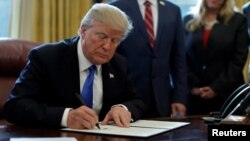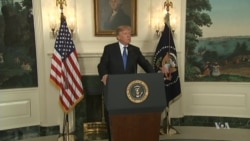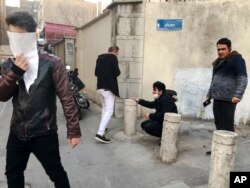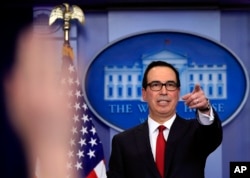United States President Donald Trump approved new sanctions on Iran Friday, while stopping short for a third time of re-imposing harsh sanctions intended to push Tehran to give up nuclear weapons research.
Trump said he was waiving the nuclear sanctions for the last time in order to give Congress and European allies 120 days to improve the agreement or face U.S. abandonment of the pact.
The president's proposals to "fix the deal's disastrous flaws" include Iran's agreement to open all sites immediately to international inspectors and an assurance from Tehran that it never develop a nuclear weapon.
WATCH: Trump Waives Iran Sanctions, Says It's the Last Time
According to the White House, any new Iran deal would have to cover Iran's ballistic missiles and limit its nuclear breakout period indefinitely.
"In the absence of such an agreement, the United States will not again waive sanctions in order to stay in the Iran nuclear deal. And if at any time I judge that such an agreement is not within reach, I will withdraw from the deal immediately," Trump said in a statement.
Additionally, the Treasury Department imposed new measures that target Iranian businesses and individuals for human rights abuses. They were imposed on 14 Iranian entities and individuals, the most prominent of whom is the head of the country's judiciary, Sadegh Amoli Larijani. The department has linked Larijani to "the commission of serious human rights abuses" against Iranian people.
Among the other blacklisted entities are the cyber unit of the Islamic Revolutionary Guard Corps, which the Trump administration maintains has stifled social media networks that demonstrators can use to communicate.
The administration official said the sanctions are part of a broader effort to counter Iran's "reckless" and "destabilizing behavior," including actions related to the crackdown on protesters, at least 21 of whom have been killed this month.
"The United States will not stand by while the Iranian regime continues to engage in human rights abuses and injustice," Treasury Secretary Steve Mnuchin said in a statement. "We are targeting the head of Iranian regime, including the head of Iran's judiciary for the appalling treatment of its citizens, including those imprisoned only for exercising their right to freedom of peaceful assembly and for censoring its own people as they stand up in protest of their government."
By law, the administration must certify to Congress every 90 days whether Iran is complying with a 2015 agreement it signed with the international community to limit its nuclear program.
In October, Trump refused to certify the agreement, saying Tehran had failed to live up to the spirit of the 2015 deal, known as the Joint Comprehensive Plan of Action, but held off on re-imposing severe sanctions on Iran's central bank and energy industry that had existed previously. Trump is expected to reaffirm the agreement next week.
Trump did not restore the sanctions on the banking and energy sectors, which were rescinded with the intent of inducing Iran to curb its nuclear program.
The decision to extend sanctions relief to Iran came after the president met with his national security team on the Iran question late Thursday.
The decision is likely to disappoint exile groups and human rights activists who had hoped for tougher measures from an administration that has voiced strong support for anti-government protests in many Iranian cities and a president who has harshly criticized the Iran nuclear agreement.
"Those are completely unrealistic and non-starter demands, and Donald Trump knows this very well," Trita Parsi, President of National Iranian American Council, told VOA. "There is no circumstance Iranians would accept putting permanent restrictions on their program that no other country has on its programs."
Mnuchin, in answer to a VOA question at Thursday's White House press briefing, suggested that Trump's actions would capture the attention of Tehran.
"The president has been very clear that many aspects of the Iran deal need to be changed," he said. "There are many activities outside of the Iran deal, whether it be ballistic missiles, whether it be other issues, that we will continue to sanction, that are outside the JCPOA."
A senior fellow for Middle East Studies at the New York-based Council on Foreign Relations, Ray Takeyh, said Trump is attempting a difficult balancing act between supporting allies who want to preserve the accord and intelligence estimates of Iran's destabilizing role in the Middle East.
"Iran's domestic repression, regional aggression and proliferation are a problem, and the challenge is trying to balance these concerns with a punitive policy," he said in a telephone interview.
Takeyh, who was formerly a State Department adviser on Iran, said the quandary facing Trump is that in the absence of European support, his ability to sanction the Tehran government is limited.
"How do you unravel an arms control agreement that has the support of a number of parties that were members to it, even though that arms deal is profoundly defective?" he asked.
On Thursday, European parties to the deal made clear they firmly support the JCPOA, leaving Trump diplomatically isolated. After a meeting in Brussels, European Union foreign policy chief Federica Mogherini said while there are concerns about Iran's development of ballistic missiles and other activities in the Middle East, those should be dealt with as a separate issue.
Iran has maintained its nuclear program is solely peaceful in nature. Iranian Foreign Minister Mohammad Javad Zarif attended the EU meeting, but did not appear alongside the other diplomats as they spoke to reporters. On Wednesday, however, Zarif accused the United States of implementing destructive policies.
The JCPOA was put in place through a United Nations Security Council resolution with monitoring by the International Atomic Energy Agency, which has certified that Iran is complying with its responsibilities that include limiting its enrichment of uranium and dismantling equipment.









